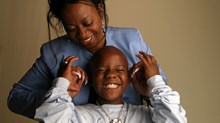I Wish I Hadn't Said That
I'm much given to regret in my encounters with others. I leave most meetings at my university saying to myself, I wish I hadn't said that. Then I spend the next week or two trying to come up with a way to undo my words and the view of me they must have created in others.
The novel I'm currently reading, Marilynne Robinson's Gilead (Picador, 2004), offers useful instruction in this matter. In it, John Ames, an aging pastor in poor health, records his thoughts on life for his young son, whom he doesn't expect to see grow up. Just about everything John Ames tells his son simultaneously challenges my spiritual complacency and affirms what I believe to be the essential nature of faith—it's not a behavioral contract with God, but the highest experience of pleasure and safety and utter liberation from worry, fear, and shame. What an impressive feat on Robinson's part—both as a writer and as an evangelist—to communicate the mandate to be holy in such an inviting way. Here's an example:
"When you encounter another person, when you have dealings with anyone at all, it is as if a question is being put to you. So you must think, What is the Lord asking of me in this moment, in this situation? If you confront insult or antagonism, your first impulse will be to respond in kind. But if you think, as it were, This is an emissary sent from the Lord, and some benefit is intended for me, first of all the occasion to demonstrate my faithfulness, the chance to show that I do in some small degree participate in the grace that saved me, you are free to act otherwise than as circumstances would seem to dictate. You are free to act by your own lights. You are freed at the same time of the impulse to hate or resent that person" (124).
I love the word freed here. The pursuit of holiness, as portrayed in this loving father's advice to his son, isn't about being burdened with the obligation to do right. Rather, it's presented as an opportunity to be freed from the impulse to do wrong. Momentarily, surely. But nevertheless freed from that automatic urge, so hard to resist, to counter meanness with meanness, ill temper with ill temper, hate with hate.
Robinson's Pastor Ames isn't really saying anything other than love one's enemies, but the way he says it reveals a deep truth about holiness: It's not a difficult task of faith, but a lovely reward—to be freed from meanness in one's daily doings. From the oppressive ugliness of judgmentalism, anger, and secret hate. From regret. From guilt.
It's also instructive, I think, to consider our enemies on a much smaller scale than we usually do. Not obvious villains, like King David's enemies, who are chasing us down, encircling us, trying to harm or kill us. Such dramatic activities locate them outside the realm of our typical experience. It's easy to read the Psalms and smugly think, Well, I don't really have any enemies. Ames's advice about loving one's enemies reveals them as the people we encounter daily. Salesclerks. Our kids' teachers. Coworkers. Even our family members and dearest friends, the ones we especially love. In a conflict, if only for a moment, any one of them can become an enemy: someone who angers us and makes us want to respond in kind, with harsh temper or resentment or cool, calculated dispassion.
How wonderful it would feel to be free of the guilt of I wish I hadn't said that. To have had, instead, an opportunity at that meeting—or in that conflict with my daughter, or my student, or my husband—to show some glimmer of the kind of love that drew me into God's protective arms and saved me from myself in the first place. To engage the world without regret, without misgivings, but with gratitude. To think to myself, upon leaving a meeting, not I wish I hadn't said that! but I am loved, I am loved, I am loved.
Copyright © 2010 by the author or Christianity Today/Kyria.com.
Click here for reprint information.
Read more articles that highlight writing by Christian women at ChristianityToday.com/Women
 Read These Next
Read These Next

 An Open Apology to Moms Everywhere(I had no idea what I was in for.)
An Open Apology to Moms Everywhere(I had no idea what I was in for.)
 Raising Strong Christian Boys5 ways I’m building up my sons’ character
Raising Strong Christian Boys5 ways I’m building up my sons’ character








 Homepage
Homepage